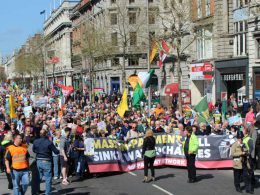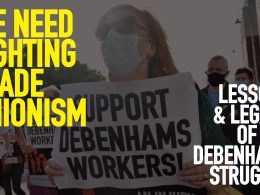By Paul Murphy TD
“The reality is that a small clique of hard-left, Trotskyite politicians, who are quite upfront about seeking to overthrow the current system, are now arguably setting the political agenda.” (Shane Coleman, Irish Independent 17 May 2016)
Although he exaggerates, Coleman captures an important part of the political reality facing the new government and the ruling class in this state. Their political position is the weakest it has been in decades. This has its roots outside the Dáil – in the undermining of all the establishment parties as a result of their implementation of austerity, and the emergence of a movement of working class people around water charges and a corresponding increase in politicisation and radicalisation. These developments found a partial expression in the general election, with the result now seen inside the Dail.
Prone to crisis
This minority Fine Gael government is reliant upon Independents for ongoing support and on Fianna Fail to allow it to continue in office. On the one hand, it has an extremely right-wing programme for government, inspired by the British Tories. On the other, it has an extremely weak position in the Dail and in society.
The consequence is very clearly a government that can be forced back and that is inherently unstable and prone to crisis. Within the first few weeks of the new government, they were forced into numerous climb downs. The first and most significant was the water charges, where they were forced to suspend the charges and pass the issue to a commission, with the hope of reviving the project in the future. That then opened the door to further climbdowns – abandoning plans for compulsory weight charges on green bins, dropping plans to link child benefit to school attendance and announcing that JobBridge will be ended.
Of course, none of these changes reflect a genuine change of mind on the government’s part. For example, they will undoubtedly come back with a plan for an altered JobBridge, with a different name. The fact that they are aggressively pushing ahead with plans for “Fit for Work” for those on disability payments illustrates that a model of “labour activation”, victimising people who are unemployed remains their strategy.
Pressure from below
However, they do illustrate a very important lesson that should be drawn by working class people. This government is weak and it can be beaten by mobilisations and pressure from below. The conclusion will inevitably be drawn – organise and mobilise now to fight for your rights.
Workers should follow the example of the Luas workers and organise to demand that they experience the “recovery” they hear so much about, with significant pay increases and improved working conditions. A major movement needs to be built to demand an immediate referendum to repeal the 8th amendment and legislate for the right of women to choose to access an abortion, as part of the struggle to separate church and state. The bubbling anger on housing should coalesce in a major national movement of protest and action to force the state to act to resolve the crisis.
Socialist alternative needed
Through building movements such as these, concessions can be won which make a real difference to people’s lives. In addition, working class people will grow in confidence and awareness through the experience of campaigning and, with an active role of socialists in advocating for socialist ideas within these movements, a socialist outlook can be developed as well. These are the conditions whereby a powerful socialist movement and a real left party to replace the weakened and rotten Labour Party can be built.
This can lay the basis for this government to be brought down in the future and to fight for a left government with socialist policies that challenge the rule of big business and the super-rich, which is essential if the fundamental problems facing the 99% are to be resolved.












